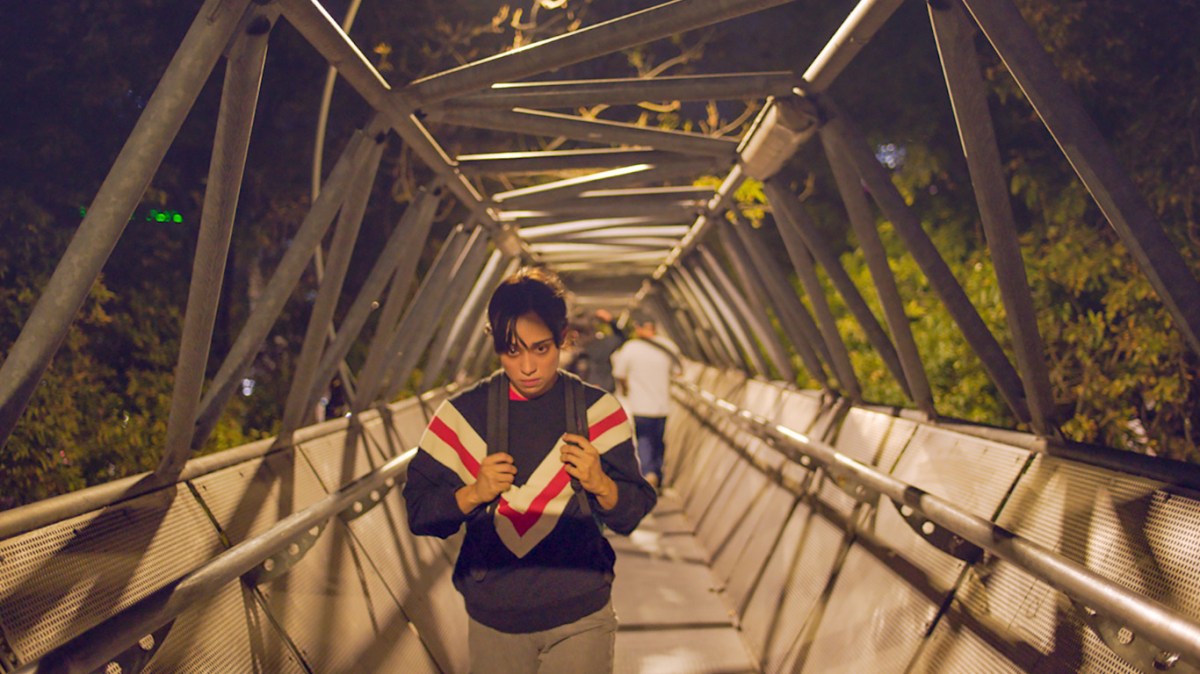One of the opening images we see in Huesera is a figure burning in an empty room, echoing the silhouette of the Virgin Mary. It is one that will come back later in the film, but will stay with you long after watching. Huesera is a sermon, a spell, a treatise on how destructive societal expectations and motherhood in general can be to someone’s identity. The debut feature from Michelle Garza Cervera is ripe with beautiful imagery, heavy atmosphere, and scares that are well-earned and unforgettable. It’s not a new idea that pregnancy is its own kind of body horror, but Huesera manages to add something truly terrifying to this conceit: what if you don’t even want the baby that’s ripping you open from the inside in the first place?
The opening scenes of the movie have us following Valeria (Natalia Solián), as she climbs her way up some stairs on a pilgrimage to see a giant, golden statue of Our Lady of Guadalupe with her mom and aunt. They’re seeking a blessing from the Virgin so Valeria can get pregnant, something she’s wanted for a while, it seems. This devotional trip seems to work, and soon enough, she discovers that she’s pregnant. Valeria and her husband, Raúl (Alfonso Dosal), seem perfectly happy with this.
However, as we learn more about Valeria and her true wants and desires, and as she starts seeing and experiencing increasingly strange and disturbing things we get the idea that motherhood isn’t what she wants after all. From creatures trying to break into her home (or wherever she may be), to shadows creaking and crackling in the dark, Valeria knows something is off here — even if her family and loved ones dismiss her outright. With no other options left, she turns to her aunt’s friends who use brujería to help her. Along the way, Valeria seeks comfort and reconnects with her past through an old flame, Octavia (Mayra Batalla). In the end, she must decide what she truly wants to escape the horrifying experiences she’s been having.
Huesera works for a number of reasons, chief among them is the performance of Solián. As Valeria, she is endlessly watchable, and is able to translate the tension she’s experiencing in the slightest ways on her face. Solián shows us everything happening within Valeria (emotionally, at least), with a glance of her eyes or the twitch of her mouth. The rest of the cast is great as well, with Dosal turning in an unbearably annoying performance as the oblivious husband, and Batalla as the fierce, independent Octavia. You get the sense that she’s the one that got away but also the person Valeria aspires to become. Aside from the noteworthy performances, the technical craftsmanship of the film also adds to the whole affair.
From the cracking of knuckles and bones, to Mexican church hymns, to the sound of a baby wailing, the soundscape of Huesera is at once both horrifying and familiar. The sound design is haunting, firmly placing you in Valeria’s headspace, and making you hyper aware of any sound at any given time in the movie. Banal dinner scenes can be rendered terrifying with the heightened awareness of the chewing and crunching of meat between teeth. Huesera is also a gorgeous film to look at. It’s both well-shot and inventive in blending imagery from both Catholicism (the beginning of the film isn’t the last place you’ll see the motif of Our Lady of Guadalupe) and brujería to create something anyone who grew up as a Mexican Catholic will recognize. This blending of imagery also adds to the tension building up in the rest of the film, making for a wholly unique and unforgettable atmosphere.
Huesera is a welcome entry in the body horror subgenre, and an impressive debut from Garza Cervera. It’s something that should be seen in the darkest theater possible, maybe late at night if you’re feeling brave.
Fantastic
Huesera is a sermon, a spell, a treatise on how destructive societal expectations and motherhood in general can be to someone’s identity. The debut feature from Michelle Garza Cervera is ripe with beautiful imagery, heavy atmosphere, and scares that are well-earned and unforgettable. It’s not a new idea that pregnancy is its own kind of body horror, but Huesera manages to add something truly terrifying to this conceit: what if you don’t even want the baby that’s ripping you open from the inside in the first place?
Huesera

